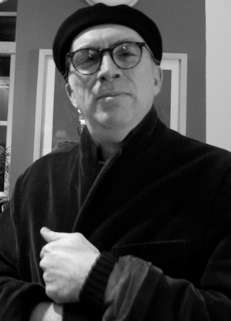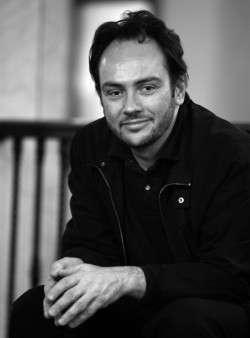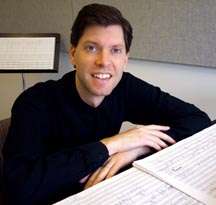|
Back
Jewels for a Forthcoming Diamond Jubilee New York
Miller Theater, Columbia University
06/04/2012 -
2012 Season Finale
Aaron Copland: Prelude for Chamber Orchestra
Carlos Sanchez-Gutierrez: Diaries (World Premiere)
Ursula Mamlok: Oboe Concerto
Pierre Jalbert: Les Espaces infinis (New York Premiere)
Anthony Cheung: Fog Mobiles (First performance of Chamber Orchestra Version)
Saar Berger (Horn), Jacqueline Leclair (Oboe), Daniel Pesca (Piano), John Schaefer (Interlocuter)
Orchestra of the League of Composers, Louis Karchin (Music Director), James Baker (Conductor)

J. Baker (© Anna Vomacka)
While Queen Elizabeth was celebrating her paltry 60 years on the throne, the League of Composers (LOC) is getting set to celebrate 90 years as the most important composers’ group in America. Thus, it was no surprise that the LOC Orchestra began its 2012 finale last night with a work by its founder, Aaron Copland. It was he (according to John Schaefer, who officiated last night) with Elliott Carter who merged their two groups in 1923, and have never looked back.
(Mr. Carter, by the way, is hale, healthy and will appear for his newest work this Friday at the Met Museum.)
The Copland work was rare indeed, a re-working from a movement of his very early Organ Symphony. Rare, but not his most impressive. This Prelude for Chamber Orchestra was tranquil, urbane (a Parisian urbanity), and showed off some of the soloists from the League of Composers Orchestra, an outgrowth of a chamber group which started in 1983.
Conductor James Baker, a percussionist by trade, didn’t favor that section of the ensemble, but did show the consistent energy and vitality for the next four works, all of whom had their composers present for short interviews.

C. Sanchez-Gutierrez (© Eastman School)
The works varied, of course, but I confess that my absolute favorite was the quirky, clever, and fantasy-laden Diaries, by the Mexican-born Carlos Sanchez Gutierrez ( commissioned by the League of Composers/ISCM/National Fund for the Arts and Culture, Mexico). Going along with his ornery personality, these four movements aren’t diaries at all, but inspirations from sculpture and “personal archeology.” While he told John Schaefer that he is fascinated by machines, nothing was machine-like here.
In fact the four movements for piano and orchestra weren’t “like” anything else. Daniel Pesca, the marvelous soloist played a series of solo phrases in the Dali-esque titled “Machine with Whiskers”, with orchestra imitating, then going against the music. In “Machine with Messiaen”, pianist Pesca played around with the piano the same way–except that at the end of each phrase, he would play repetitive notes at the top of the scale. Obviously one of Messiaen’s birdcalls. His “Dream Bolero” was only faintly Spanish but obviously danceable, and his final “Machine with Roller chains” was somewhat like the first.
A bit longer than bagatelles, each movement was clever and jaunty, not so much amusing as comfortably witty. They were, in fact, quite wonderful.
That revered lady, Ursula Mamlok–who left Berlin in 1939 at the age of 16, lived in Ecuador, then New York, and now is back in Berlin–made a visit to celebrate her newly orchestrated Oboe Concerto, a piece recorded by Heinz Holliger and which is still one of the most difficult for oboe of the past century. Ms. Mamlok is played rarely in this country, perhaps because, while a brilliantly schooled writer, never had the futurist brilliance which made her stand out.
That, though, was belied by this Concerto, and its performer, Jacqueline Leclair, who sailed through the difficulties–double-toning, buzzing, harmonic highs–as though born to the trade. The three connected movements had virtual non-stop playing by Ms. Leclair, beginning with a near-cadenza and going on through a series of extended techniques in an engagingly lyrical work.
Anthony Cheung, the youngest of the group with a splendid academic career and a forthcoming year in Rome, had revised his Fog Mobiles (the latter word analogous to Calder’s mobiles) from large orchestra to the 34-piece orchestra here, but the main chore fell to the Israeli-born French horn player Saar Berger. This was one of the two tone poems of the evening, an exploration of the fog horns along Mr. Cheung’s San Francisco Bay.
Mr. Berger, whether playing in front of the orchestra or walking to the back of Miller Theater for the final echo effects, handled it all well, but I personally found the new orchestration….well,….foggy, with horns against the obvious chirping of seagulls. A nice try by Mr. Cheung, yet perhaps limited by the subjects. Jacques Ibert handled this perfectly–and briefly–in his Ports of Call. Mr. Cheung let it go on and on.

P. Jalbert
The fourth composer, Pierre Jalbert, based his tone-poem on the Pascal pensée, “The eternal silence of infinite spaces terrifies me”, though he told Mr. Schaefer that spaces do not terrify him.
Nor do orchestras. Pascal’s profundity was brought down to orchestral size, size and space unfolding with tranquility (the harp adding a Mahlerian flavor), continuing into a more forceful, denser, more emphatic middle, and then back again...into Mr. Pascal’s infinite space.
The form was simple, the orchestration economical, the result was the perfect art. Mr. Jalbert took his concept, developed it until there was nothing more to develop and ended...with just enough titillation for us to wish it go on a bit longer.
Harry Rolnick
|